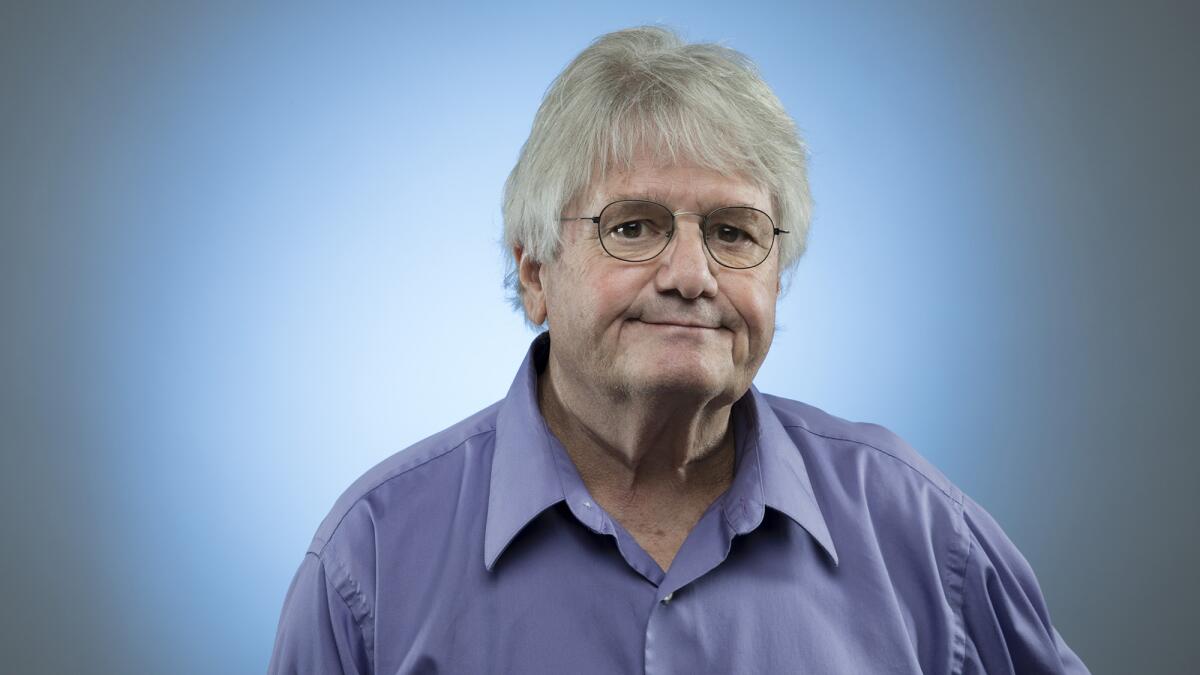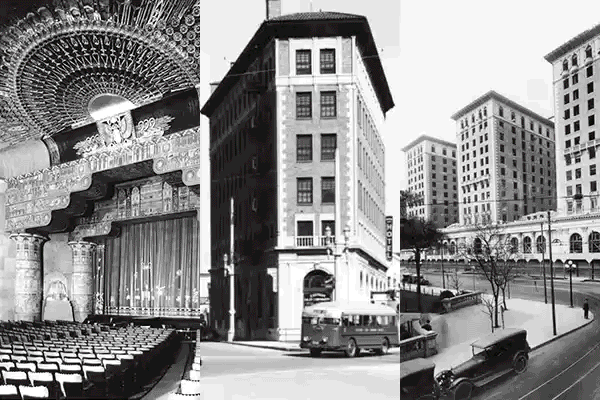The Best of Bob Pool: An L.A. storytelling original

It’s a risky proposition to create a “best of” list for Bob Pool stories in the Los Angeles Times.
Not only are there too many to choose from — more than 4,000 — but there are few shortcuts for finding the true gems. That’s because Pool hated writing for Page 1. He favored economy over length. And the headlines rarely did justice to tales he could weave way inside the old Times Valley Edition, say, on a page next to GE refrigerator ads.
Readers could chuckle at one story Pool wrote for inside the Metro section in 1984, then notice that was one of three bylines he had on the page and that the real winner was at the bottom, in this case, the tale of a Canoga Park homeowner named Jeanette Kohane, whose discovery of chocolate cake smeared on her home (she assumed it was vandalism) led police to a crime ring that was stealing food from the local school’s cafeteria.
Pool was beloved by readers for his empathy, humor and wit, and his ability to tell tales about Los Angeles that made the metropolis feel like a small town.
Pool, who died Sunday, was a legend in The Times newsroom for three decades. Most of that time, he did not have a defined assignment. His beat was “the Bob Pool story,” a perfect slice of the Los Angeles human condition that on many days made reading a newspaper chronicling wars, sleazy politicians, economic distress and environment degradation somewhat bearable.
He had an eye for stories you would want to read. He found people you wanted to know. He respected your time. And he knew how to make you smile (during his early days at the Thousand Oaks News-Chronicle, he knew how to get you interested in a municipal government piece: “Although they’re already up to their knees in sewage effluent, Las Virgenes Municipal Water District leaders agreed Monday night to consider expanding their sewer system to Topanga Canyon.”)
Bob had a desk in the newsroom, but he was most likely out in the field, discovering the unexpected, the surprising and the slightly absurd. In West L.A., he caught up with the head of the Early Typewriter Collectors Assn. — a man in possession of more than 70 machines. But Bob didn’t write it as a nostalgia piece. It turned out he produced the group’s newsletter on a Mac.
“A computer is so much better,” said the Typewriter King.
As Times columnist Steve Lopez wrote of Pool on his 2014 retirement: “He’s the ultimate reminder to reporters that “good things happen when you blow off news conferences, set fire to press releases, get out of the office and celebrate the daily drama on what might be the world’s greatest stage.”

Bob, meet Bob. And another Bob
Pool had a knack for orchestrating a story into something more magical. So in 1991, he had an idea when David Rensin and Bill Zehme published the “The Bob Book,” which Pool described as a paperback that aimed to explore the “name Bob backward and forward.”
He arranged to have Times photographer Bob Chamberlin take the pictures, and editor Bob Welkos edited the story.
As for the name, Pool found merit.
There has never been a President named Bob or a King Bob or a Pope Bob, of course. But Rensin and Zehme have decided that men named Bob are men who get things done.
True, Bobs do “enjoy a solid sense of sameness.” But they are decent, dependable types who instinctively make the most of a bad situation, according to the book. Bobs are sensible, approachable, likable and reliable. Not to mention predictable.
Nobody named Bob could have ever written “The Bob Book,” said Rensin, 41, of Sherman Oaks. That’s because Bobs are too pragmatic and unpretentious. Bobs don’t wear berets or quote Nietzsche or hang out at Renaissance fairs, he said. “They don’t take themselves seriously.”
Pool used to tell colleagues he was grateful for being named “Bob.”
What would have happened if his parents named him Seth, he joked.
The bellman from Bell who became a bellwether in Bel-Air
Pool always preferred the little guy over the big name. That is why he was drawn to the story of Tony Marquez:
Once the packages went in the box, Tony Marquez’s award was in the bag.
That’s the short version of how a Los Angeles bellhop has won the title of best hotel worker in America.
Marquez is bell captain at the Hotel Bel-Air. It’s the sprawling hideaway in Stone Canyon north of Westwood where cottage-like suites can go for $3,000 a night — and celebrity guests can come with a truckload of luggage.
But schlepping heavy suitcases and trunks around the Bel-Air’s 12-acre grounds isn’t what earned Marquez a national hotel-rating service’s only individual five-star ranking.
Pool ended the 2004 piece with one of his more beloved kickers: “So says the bellman from Bell who became a bellwether in Bel-Air.”
Santa Pool
In 1990, Pool spent weeks undercover as a retail Santa Claus, reporting a series of stories that would become Times Christmas classics:
By last weekend, I’d spent three weeks portraying Santa in shopping centers and elsewhere around town. I figured I had the slow-gaited Santa walk down pat. Ditto the Santa talk — the patter about what children want for Christmas, the milk and cookies they plan to leave out for me and the importance of brushing teeth and going to bed on time.
“Santas always wonder about it, but I don’t think you should have any fears about being recognized,” said Jenny Zink, head of the Santa Division for Western Temporary Services, who has hired 3,500 St. Nicks across the country this month. Costumed Santas even go unrecognized by their own children, she said.
But Mrs. Claus was not a believer. “Rachel will know who you are,” she fretted. “You’ll destroy her.”
I was undeterred. To make the test complete, I arranged for several of my nieces and nephews from Valencia to also visit with Santa. Mrs. Claus threw up her hands when she heard that.
Pool closed another in the series this way: “At the end of my shift, I took my aching back home for a long, steaming shower. My beard went for a soak in a bath of lukewarm water and Woolite.”
The guest who never checked out
It’s no surprise Pool was drawn to Thelma Becker, who as he reported in 1988, checked into downtown L.A.’s Biltmore Hotel “on Jan. 7, 1940, and never checked out.”
These days, hotel staff members look after the 5-foot-tall Becker as if she was each one’s mother. She is a guest at the hotel’s annual employee Christmas party. She has her own mail box at the employee mail center.
She was invited into a heavily guarded ballroom for a peek at the silver table settings before the Duke and Duchess of York arrived for a recent formal dinner.
“She knows everything about the hotel,” said Evelyne Gibert, manager of the Biltmore’s pastry shop. “If we do the pastry wrong, she’s not afraid to let us know. She knows the ingredients I put in the pastry. She even knows my husband.”
Becker remembers employees’ birthdays with gifts or, in the case of Biltmore public relations director Victoria King, with a surprise party on Tuesday night at a Mexican restaurant.
“She gives me the funnies from her paper every Sunday,” said front desk clerk Teina Tahauri.
The L.A. gas station canon
Over the years, he developed a few favorite topics he returned to over and over, with the L.A. gas station perhaps topping the list.
When mini-malls began replacing service stations in the 1980s, he found many residents had surprisingly emotional bonds to their fill-up spot. He wrote about fake gas stations and competing Chevron stations at the same Fairfax District intersection (“They like not having to make a left turn to get in here”), and the 76 station located in the Dodger Stadium parking lot.”
One of his most famous was a piece about Paul Moghadan’s opulent, chandelier-lighted restroom at his West Covina Chevron station. “In an era when many service stations can barely keep their restrooms open, much less clean, Moghadan’s is a sight for sore eyes, not to mention bursting bladders,” Pool wrote.
“A fancy toilette, he says, is good for the bottom line.”
More to Read
Sign up for Essential California
The most important California stories and recommendations in your inbox every morning.
You may occasionally receive promotional content from the Los Angeles Times.












